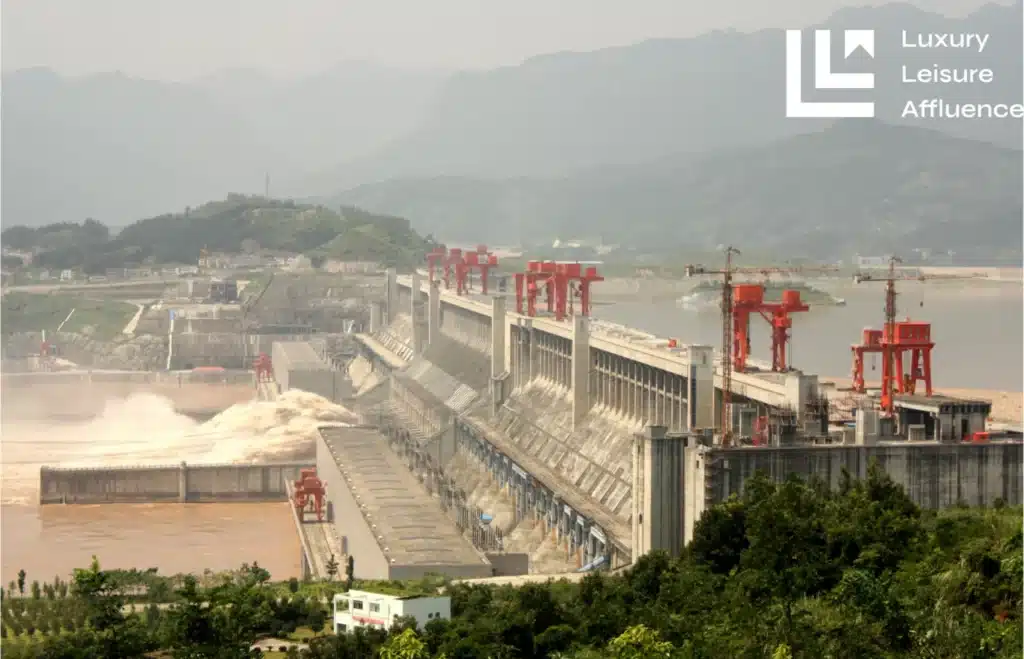Updated On: April 07, 2024 by Issraa Saeed
Civil engineering is a vital discipline encompassing the design, construction, and maintenance of infrastructure projects shaping our world. From towering skyscrapers and intricate bridges to transportation networks and hydroelectric dams, civil engineers play a crucial role in transforming concepts into concrete structures. Civil engineering has witnessed remarkable achievements throughout history, with visionary engineers pushing the boundaries of innovation and leaving a lasting impact on societies worldwide. This article on civil engineering will delve into notable projects, influential figures, and the immense significance of this field in shaping our built environment.
What Is the Largest Civil Engineering Project?
There are many unique civil engineering projects worldwide. Here are 10 notable civil engineering projects from around the world with estimated budgets:
1. The Great Wall of China
The Great Wall of China is one of the most famous and extensive civil engineering projects; the Great Wall of China stretches over 21,196 kilometres (13,171 miles) across northern China. The exact budget for constructing the Great Wall of China is still being determined, as it was built over centuries. It was primarily constructed during the Ming Dynasty (1368-1644), and the government covered the expenses through taxes and labour contributions.
2. Three Gorges Dam, China

Three Gorges Dam, China, is considered a hydroelectric dam on the Yangtze River; it is the world’s largest power station by installed capacity. It generates clean energy and provides flood control and navigation benefits. The estimated budget for the Three Gorges Dam project was around $28 billion. However, the total costs, including relocation of residents and environmental mitigation, are difficult to determine precisely.
3. Palm Jumeirah, Dubai

An artificial island shaped by a palm tree, Palm Jumeirah is a remarkable feat of engineering that extended Dubai’s coastline and created prime real estate. The budget for the Palm Jumeirah project is around $12 billion; this includes the reclamation of land, construction of infrastructure, and development of residential, commercial, and tourism facilities.
4. Channel Tunnel (Eurotunnel)
Channel Tunnel is an undersea tunnel that connects the United Kingdom and France, stretching for 50.45 kilometres (31.35 miles). It consists of three tunnels, including one for trains and two service tunnels. The construction cost of the Channel Tunnel project was approximately £4.65 billion (equivalent to around $6 billion) when it was completed in 1994.
5. Millau Viaduct, France

Millau Viaduct is a cable-stayed bridge that spans the Tarn Valley in southern France and is the tallest bridge in the world. It is known for its elegant design and impressive height. The budget for the Millau Viaduct was approximately €400 million (around $480 million) when it was constructed. The project was privately funded through tolls collected from users.
6. Burj Khalifa, UAE

Burj Khalifa is the tallest building on earth, 828 meters (2,717 feet). It required advanced engineering techniques to ensure its stability and safety. The estimated budget for the Burj Khalifa project was about $1.5 billion; this covers the tower’s construction, surrounding infrastructure, and development of the adjacent Downtown Dubai area.
7. Panama Canal Expansion

Panama Canal Expansion was Completed in 2016. It included the construction of new locks and required significant excavation and engineering work. The Panama Canal Expansion project budget was approximately $5.4 billion; this included the construction of new locks, excavation work, and related infrastructure improvements.
8. High-Speed Rail Network, Japan
Japan’s Shinkansen, or bullet train, the network is renowned for its speed, efficiency, and safety. It was a groundbreaking project that revolutionised rail travel. The budget for Japan‘s high-speed rail network, including the Shinkansen lines, is difficult to determine as it was constructed over several decades. The total investment in the Shinkansen system is hundreds of billions of dollars.
9. Hoover Dam, United States

Built on the Colorado River, the Hoover Dam is an iconic structure that provides hydroelectric power, flood control, and irrigation water to the southwestern United States. The original construction cost of the Dam project, completed in 1936, was around $49 million (equivalent to approximately $825 million today’s value).
10. Gotthard Base Tunnel, Switzerland
Gotthard Base Tunnel is a railway tunnel that is the longest and deepest in the world, with 57.09 kilometres (35.5 miles). It provides a crucial link for passenger and freight transportation in Europe. The estimated budget for the Gotthard Base Tunnel project was approximately CHF 9.6 billion (around $10 billion); this includes tunnel construction, railway infrastructure, and associated facilities.
These projects demonstrate the remarkable achievements of civil engineering in infrastructure development, transportation, energy generation, and urban planning. These budget estimates are based on the available information.
Which Country Is No 1 In Civil Engineering?
It is difficult to determine a single country as the “number one” in civil engineering, as different countries excel in various aspects of the field. Many countries have significantly contributed to civil engineering through groundbreaking projects, technological advancements, and research. Several countries are renowned for their expertise and advances in civil engineering:
- United States: The United States has a long history of significant civil engineering achievements. American universities and research institutions are also at the forefront of civil engineering research.
- China: China has witnessed tremendous growth in civil engineering in recent decades. The country has undertaken massive infrastructure projects like the Three Gorges Dam and an extensive high-speed rail network. Chinese engineering firms are also involved in large-scale projects around the world.
- Japan: Japan is known for its innovative approaches to civil engineering, particularly in earthquake-resistant design and high-speed rail technology. The Shinkansen (bullet train) network is a testament to Japan’s engineering prowess.
- Germany: Germany has a strong reputation for engineering excellence, particularly in areas such as transportation infrastructure, renewable energy, and sustainable construction practices. The country is renowned for its precision and technical expertise.
- United Kingdom: The UK has a rich history of civil engineering achievements, including the Channel Tunnel and numerous iconic bridges. British engineers have made significant contributions to structural engineering and construction techniques.
- Switzerland: Switzerland is recognised for its tunnelling and underground construction expertise. Projects like the Gotthard Base Tunnel and the Lötschberg Base Tunnel demonstrate the country’s proficiency in challenging mountainous terrain.
- Netherlands: The Netherlands is known for its innovative water management and hydraulic engineering approach. The country’s expertise in managing flood protection systems, land reclamation, and sustainable urban planning is highly regarded.
These are just a few examples; many other countries have made noteworthy contributions to civil engineering. Civil engineering is global, with expertise and advancements from various nations worldwide.
Which Country Wants Civil Engineers Most?
The demand for civil engineers can vary from country to country based on factors such as infrastructure development, population growth, urbanisation, and economic activity. Several countries are actively seeking civil engineers to meet their infrastructure needs. Here are a few countries that have a high demand for civil engineers:
- United States: The United States has a significant demand for civil engineers due to ongoing infrastructure projects, urban development, and the need to maintain and upgrade existing infrastructure.
- China: China’s rapid economic growth and ambitious infrastructure development plans have created a strong demand for civil engineers. The country is involved in numerous large-scale projects, including transportation networks, high-speed railways, and urban development.
- United Arab Emirates (UAE): The UAE, particularly cities like Dubai and Abu Dhabi, has been experiencing significant construction and infrastructure development. The country constantly demands civil engineers support its ambitious building projects.
- Australia: Australia’s growing population, urban expansion, and investment in infrastructure make it a country with a strong demand for civil engineers. Major transportation, water management, and energy projects contribute to the need for skilled professionals.
- Canada: Canada’s vast territory and ongoing infrastructure projects create a demand for civil engineers across various sectors, including transportation, energy, and environmental engineering.
- India: With a large and rapidly expanding population, India requires civil engineers to address its infrastructure needs. The country invests in transportation networks, renewable energy projects, and urban development.
- Saudi Arabia: Saudi Arabia has invested heavily in infrastructure development, including mega-projects such as NEOM and the Riyadh Metro. Civil engineers are in demand to support these ambitious initiatives.
The demand for civil engineers can change over time as infrastructure needs and economic conditions evolve. Countries not mentioned here may also have significant demand for civil engineers based on their circumstances and development plans.
Who Is the Biggest 10 Civil Engineers in The World?
Determining the “biggest” civil engineers worldwide is subjective and can vary based on project scale, recognition, and impact criteria. However, here are ten influential civil engineers who have made significant contributions to the field:
- Gustave Eiffel (France): Known for his iconic design of the Eiffel Tower in Paris and his innovative structural engineering techniques.
- Isambard Kingdom Brunel (United Kingdom): An influential engineer in the 19th century credited with projects like the Great Western Railway and the Clifton Suspension Bridge.
- Fazlur Rahman Khan (Bangladesh/United States): He is renowned for his pioneering work in structural engineering and for developing the “tube” structural system for skyscrapers.
- Elmina Wilson (United States): The first female civil engineer in the United States, known for her expertise in steel structural design.
- John Augustus Roebling (Germany/United States): Notable for his design of the Brooklyn Bridge, one of the most iconic suspension bridges in the world.
- Sir Ove Arup (Denmark/United Kingdom): Founded the engineering firm Arup, known for his multidisciplinary approach to design and involvement in notable projects worldwide.
- Santiago Calatrava (Spain/Switzerland): An architect and civil engineer known for his distinctive and sculptural designs, including bridges, railway stations, and cultural buildings.
- Zaha Hadid (Iraq/United Kingdom): Although primarily an architect, Zaha Hadid’s innovative designs often incorporate complex engineering principles, pushing the boundaries of architectural engineering.
- Jörg Schlaich (Germany): A prominent structural engineer recognised for his expertise in lightweight and sustainable structures, including cable-stayed bridges and solar power towers.
- C.Y. Leung (Hong Kong): A civil engineer and former Chief Executive of Hong Kong who has played a great role in the region’s urban development and infrastructure projects.
These individuals have impacted civil engineering through innovative designs, techniques, and meaningful projects. However, this list is incomplete, and numerous other accomplished civil engineers have significantly contributed to the field.
Civil engineering is a testament to human ingenuity and the pursuit of progress. The remarkable projects and influential engineers mentioned in this discussion represent a fraction of the immense contributions made within this field. As societies continue to grow, evolve, and face new challenges, the demand for civil engineers remains significant. The field will continue to play a crucial role in designing sustainable and resilient infrastructure, addressing the impacts of urbanisation, mitigating climate change, and improving the quality of life worldwide. Civil engineers shape our world through their expertise and dedication, leaving behind a lasting legacy for generations.











